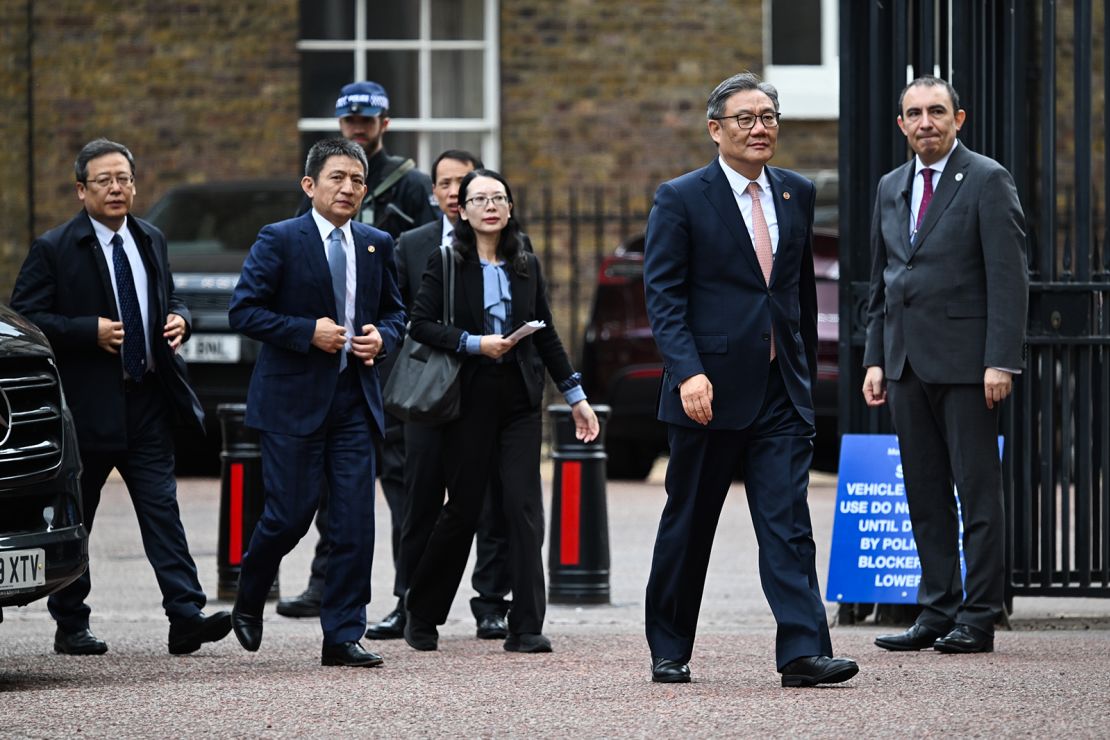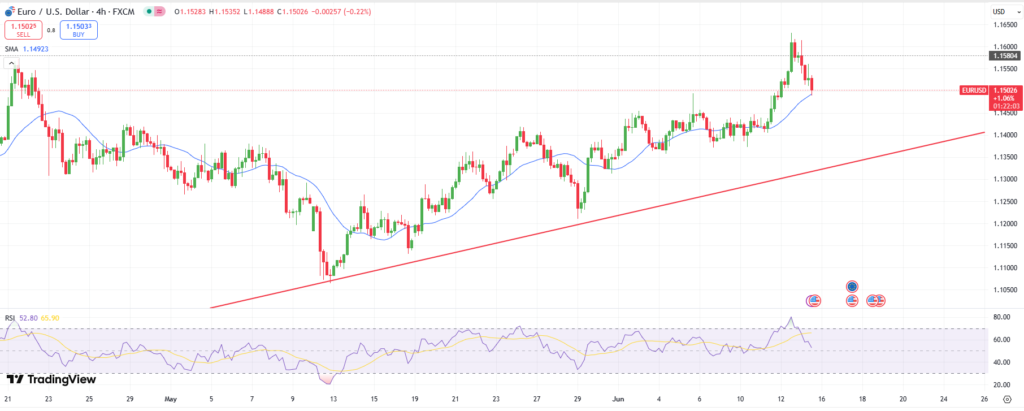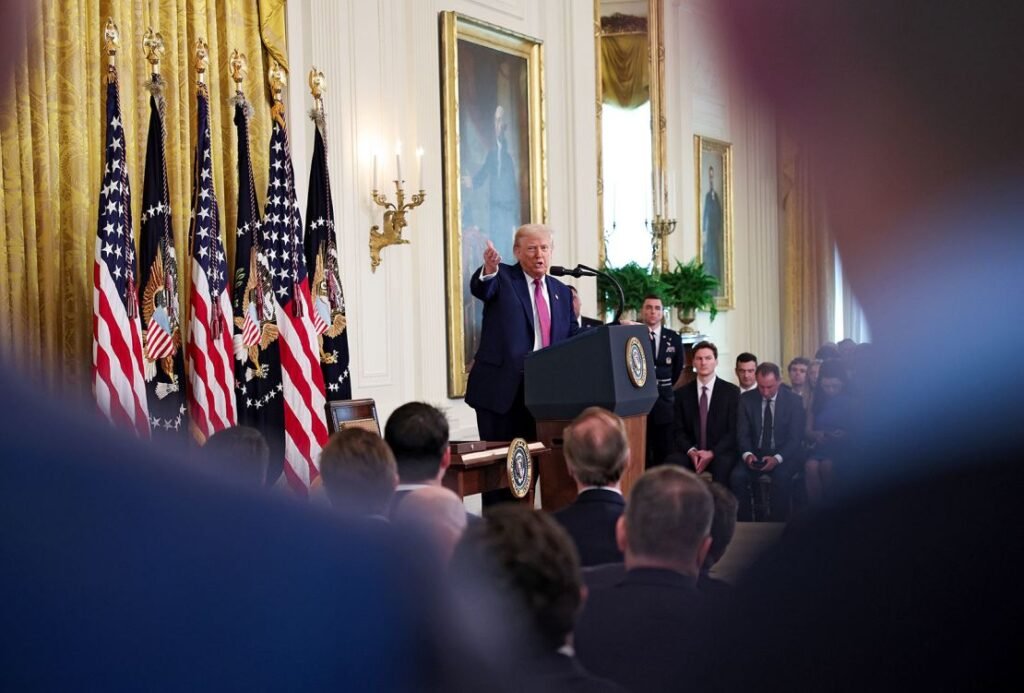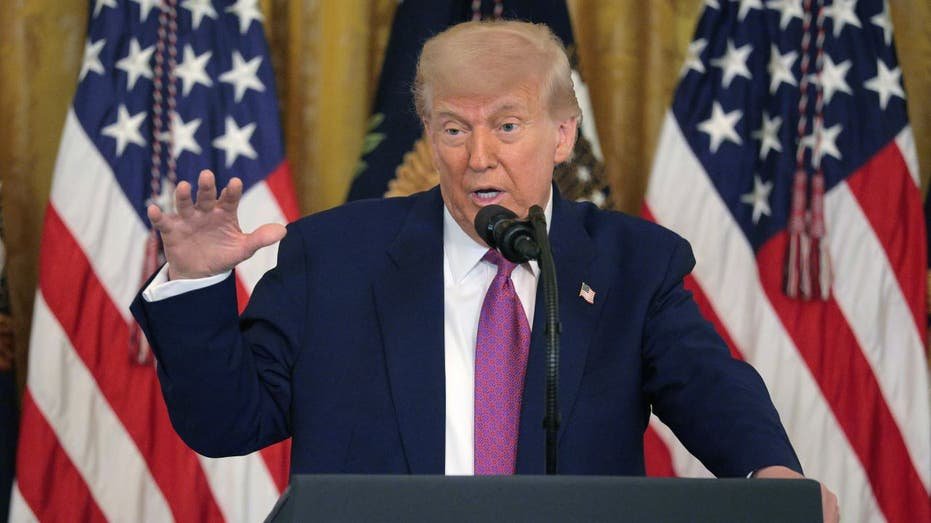Hong Kong
CNN
—
The United States and China have agreed on a framework to implement their trade truce, officials on both sides said Wednesday, after concluding two days of talks in London to defuse tensions and ease export restrictions that threaten to disrupt global manufacturing.
American and Chinese negotiators agreed “in principle” to a framework on how to implement the consensus reached by the previous round of talks in Geneva last month and a phone call between the two countries’ leaders last week, China’s trade negotiator Li Chenggang told reporters in London, according to Chinese state broadcaster CGTN.
Officials on both sides will now take the proposal back to their leaders for approval, US Commerce Secretary Howard Lutnick told reporters in a separate briefing in London, Reuters reported. “If that is approved, we will then implement the framework,” he said.
While neither side disclosed any specifics of the deal, Lutnick indicated that both had agreed to roll back export controls on goods and technologies that are crucial to the other.
China’s restrictions on exports of rare earth minerals and magnets to the US will be resolved as a “fundamental” part of the framework agreement, Lutnick said, according to Reuters.
“Also, there were a number of measures the United States of America put on when those rare earths were not coming,” he added. “You should expect those to come off, sort of as President Trump said: ‘In a balanced way.’”
Frustrated by what it saw as Beijing’s retreat from its pledge made in Geneva to ease rare earth exports, the US restricted chip design software sales to China and vowed to “aggressively revoke” Chinese student visas.
Kevin Hassett, director of the National Economic Council, told CNBC Monday that the Trump administration may be open to loosening restrictions on some microchips that China views as critical to its manufacturing sector. The US will maintain restrictions on “very, very high-end Nvidia” chips that are capable of powering artificial intelligence systems, he added.
CNN has reached out to the White House for comment.
The latest round of talks, held at the ornate Lancaster House in central London, underscored the increasingly central role export controls have played in the trade war between the world’s largest economies.

It also highlighted Beijing’s powerful leverage from its dominance of the rare earth supply chain – and its growing readiness to wield it in pressing the US to ease export restrictions on China.
Rare earth minerals and their magnets are essential for everything from cars to fighter jets, and China holds a near-monopoly on these materials that are critical to American industries and defense.
Following their long-anticipated phone call last week, Trump said Xi had agreed to restart the flow of rare earth minerals and magnets, though he did not elaborate on how fast that would happen or the volume of the materials that would be released.
Since early April, when Beijing imposed new licensing rules on certain minerals in response to Trump’s tariffs, China’s overseas shipments of rare earths have plunged, threatening industries globally, from electronics and defense to energy and carmaking.
Over the past month, Trump has imposed punitive measures on Beijing, including limits on technology sales to China and threatening to revoke the US visas of Chinese students, which was prompted by a belief that China had failed to live up to commitments it made in Geneva, administration officials told CNN in May.
The measures also include a ban on US companies selling to China software used to design semiconductors. The White House additionally warned US companies against using artificial intelligence chips made by China’s national tech champion Huawei.
The moves have triggered backlash from China, which views Washington’s decisions as violating the Geneva consensus.
The US and China agreed in the Swiss city on May 12 to temporarily roll back crippling tariffs on each other and use a 90-day window to hash out a broader deal to address their trade imbalance. But despite the reprieve, China’s exports to the US suffered a steep decline of 34.5% in May, according to Chinese customs data, and the renewed friction necessitated another round of talks.
“The progress made during this round of talks in London is conducive to further building trust between China and the United States, promoting the stable and healthy development of China-US economic and trade relations,” Li, China’s top international trade negotiator and vice commerce minister, said Wednesday, CGTN reported.
Although US access to rare earths has not been a source of friction until recently, the feud over advanced technology has been rumbling for some time. In recent years, Washington has stepped up efforts to restrict China’s access to chip-related technologies, aiming to prevent Beijing from using American innovations to bolster its military and AI capabilities.
During his first term, Trump imposed targeted restrictions on companies like Huawei, including limits on chip sales to them. In 2022, then-President Joe Biden intensified these efforts, curbing the sale of advanced semiconductors to China over concerns that they could power its military. The controls were subsequently expanded to include restrictions on sales of chipmaking equipment, high-bandwidth memory chips and even products manufactured outside the US using American technology, in order to limit China’s technological progress.
The mounting restrictions have put heavy pressure on China’s strategic sectors that Xi has prioritized, including semiconductors and AI.
But in recent years Huawei, the Chinese telecom and electronics giant, has re-emerged as a national champion, with Beijing pinning its hopes on the company to lead innovation in these sectors.
Although US restrictions initially crippled its smartphone business, the company made a stunning comeback in 2023 with a handset powered by advanced chips, technology Washington believed it had blocked. The launch of the Mate 60 smartphone in 2023 even triggered investigations by the US government.
In a rare interview Tuesday, Ren Zhenfei, the founder of Huawei, dismissed the impact of the technology restrictions the US had imposed on China and Huawei, while conceding that its chip technology remains one generation behind US technology.
“The US has exaggerated Huawei’s capabilities. We’re not that advanced yet,” he told the People’s Daily, a newspaper run by China’s Communist Party.
But he added that China’s current needs could be met by bundling microchips together, an approach the industry commonly refers to as packaging or stacking.
“There’s actually no need to worry about the chip issue. By using methods like stacking and clustering, the computational results are comparable to the most advanced levels,” he said.
This story has been updated with additional reporting and context.





